- Home
- Christine Morgan
The Raven's Table Page 14
The Raven's Table Read online
Page 14
Yes, the rats know me. They like me. In a way, we are friends.
We meet in grave-yards and barrows and burial-mounds. We meet in the gritty soot of funeral-pyres, sifting together through burnt wood and char-blackened bones. There, the rats find their meals cooked, if overdone. The nails I take from the ashes are hardened, baked like potter’s clay, stained with a glaze of rendered fat and blood. These serve their own special purpose.
On the battlefields, as well, the rats and I often meet. So too the ravens, the wolves, and flies in roiling, buzzing green-black clouds. Sometimes, I see folk there, men and women, even children. They go searching for survivors or loved ones, or to snatch up what plunder they can from the dead… silver and gold, weapons, mail-coats and treasure.
I avoid them.
They know me, though not as the rats do. Not as friends. They fear me. They tell their tales of me, but not all that they tell in the tales is the truth.
They think I am many.
But I am only one.
There is no great army of Naglings, no spirit-horde.
Only one. Only me.
Safne, I am called, or Nagl-Safne in full.
The Gatherer. The Nail-Taker.
Here in this pit, where plague-corpses have been dumped, it is a bountiful harvest. The rain turns more to sleet as dusk deepens toward night, but compared to the realm of my birth, the sleet is mild as bath-water. It has nothing on cold Niflheim, which itself has nothing on the Fimbul-Winter that will come.
And each nail that I pull helps to hasten its onset.
I take them all. Male and female, young and old. Even the tiny, fragile nails of babes, which must be done with the most exquisite deftness of touch.
Mothers tell their children not to bite their nails, or chew their hair. This, they say, will cause the remnants to amass in their gizzards, forming into knots like owl-pellets. “It will cause belly-aches,” they’ll tell them, “and the Naglings will find you, slice you open, cut out your gizzard and steal it as you sleep.”
A ridiculous lie, but if it does keep them from biting their nails, so much the better. As long as they also neglect to trim them before they die.
Once the nails have been trimmed, clipped or cut, I can do nothing with the shreds and scraps left over. Those are useless to me. Useless to my purpose.
Most folk are mindful of that truth, and will give care to their grooming. All the more so when they must face risk of death, as when men ready for battle or war. They are reluctant to contribute to the cause that I serve.
Plagues such as this, sudden and far-reaching, are therefore a windfall.
One by one, finger by finger, hand by hand, toe by toe, foot by foot, I pick bare the corpses in the funeral pit. The nails go into my bag. It is nearly full. I have been busy.
Last of all, I reach the cart-driver’s boy. I unwrap the cloak. The life-heat has leached from his body, but the stiffness has not yet set in and the pallor barely greys his skin. He might almost be in a deep slumber.
He is not. He is dead. He does not flinch when I grip each nail in the tin pincers and peel them free. No beads of blood well up from the raw nail-beds.
I find when I remove his shoes that he is missing three toes on one foot. The flesh is gnarled with old scars where they had once been. A childhood injury, but one that had not unduly impaired him; I had not noticed him limping.
There are still two toes, two nails to take, and I do. Yet I consider it a sign, a sign as good as any. My bag is close onto full. It is time to go.
I whistle for my hound. His name is Hrugbein, heap-of-bones. Though the runt of the litter, he is a great and ugly gangly thing, large enough to bear me upon his back. I swing astride, pressing my knees to his ribs and clinging tight to clumps of coarse, patchy fur.
We are off at a run. Ungainly as his gait may be, Hrugbein is fast-footed, bringing us swiftly away from the village and plague-raddled land. We seem to fly along the road where souls trudge their hopeless journey. They avert their haunted gazes as we pass.
Torch-fires at the bridge burn a freezing blue-white, winter flames carved of the deep hearts of glacier’s ice. The river rushes beneath us, a noisy tumult in the darkness. The guards stand aside, the gates open for us, the terrible snow whirls and chills, and we come to Eljudnir, the cold sleet-sprayed hall.
Eljudnir is the dwelling of the corpse-queen, pitiless Hel, keeper of the unchosen dead. Hel, daughter of Loki. Hel, half her body fair and beautiful and unblemished, the other half rot-black, skin sagging and sloughing with decay. Hel, the dreaded gloom-goddess.
Sloth and Laziness serve her, while Age and Infirmity manage the household. In the feasting-chambers, the tables are built of Deprivation, laid with Thirst’s cups and Hunger’s plates, and the knives are Famine. The beds, made of Sickness and Discomfort, are spread with blankets woven from Restlessness. Bladder-stones pebble the floors of the necessary rooms, where the boards are holed with Constipation, Flux and Cramping.
This is not a place of torture but of bleak and simple miseries. Ever damp, ever dreary. Noses drip. Skin itches. Joints and teeth ache. Mist and fog obscure all. Silence, sorrow, tedium and grief hold sway.
This is Niflheim, realm of Hel, who is my mother.
She is, and always has been, unsure what to make of me… her strange child… not son nor daughter, not both but neither. I, Nagl-Safne, grey and sexless, in my garment stitched from rat-skins, with the husks of beetles knotted into the lank locks of my hair. I with my belt-ring where the tools of my trade clink and rattle, and my gathering-bag slung around my neck.
I show it to her, the bag, brimming with nails of all sizes. She stirs through them with her own long, pale hand. The sound is a dry susurration that hisses and whispers, harsh utterances of loss, wistful sighs of the dead.
Hel nods to me. Half her mouth curves in a brief smile, displaying satisfaction but no warmth. The other half remains twisted in a fierce, down-cast sneer.
It is sufficient for now. I am dismissed, given leave to go.
Nearby, upon a throne of chained honor sits Baldr, prince-hostage among the gods. His gaze follows me, solemnly, as I cross the wide somber hall. I raise the bag to him. I give it a shake, as a merchant might shake a weighty pouch of silver. I grin. He looks away. He knows that my work hastens the end of his imprisonment here, yet he cannot bear to well-wish that endeavor for he also knows what else it will bring.
I clamber again onto Hrugbein’s back. We ride forth from Eljudnir with such speed that the rime-frozen land becomes but a blur. Over ice-fanged mountain peaks and chasms where waterfalls plunge, through a vast and still forest, we race and we ride; this path is familiar to us, for we have ridden it a thousand-thousand times.
It brings us to the home of the giants on the foaming eastern sea. It brings us to the ship-yard where the most feared ship of all awaits completion.
The ship-master is here as well, Hrym, my father. Ancient and decrepit he may be, and perhaps as mad as some say, but none can deny his skill. Such craft, such genius and artistry, none in the Nine Worlds have ever before seen.
Terror and pride rise in my blood as I behold again the hugeness of the unfinished Naglfar. From a distance, it might seem to be made of bleached birch-wood and bone. Only nearer does its true nature become clear.
Naglfar, the Nail-Ship.
The hull and deck-plankings… the rails, mast and oars… the prows sweeping up, defiant, beast-headed… it is built bit by bit, piece by piece, of what I painstakingly gather from the fingers and toes of the dead.
They are placed overlapping like snake-scales, like roof-shingles, like the rows of shields forming an army’s shield-wall. They have give, one against the other, like scales as well. Like the links of a mail-coat, strong but flexible.
I bring my bag to Hrym, at his sorting-table. He pours the bounty from it.
“Ah,” he says, pleased.
He permits me to help. We sort the nails. We scour them clean in basins of sand, scrubbing
the dried fluids, filth and flesh from them.
The nails of dead men are more prized for the hull, being larger and thicker, stronger, more durable. Yet those of women and children have their uses as well, in the finer fittings and for decoration. Most are yellow-white; some are char-blackened or otherwise stained. They are smooth or ridged, sharp or blunt, sometimes nicked or chipped. These variations in size and shape, color and texture, let them be worked into intricate patterns.
Few might even notice the beauty, and fewer still appreciate. But I do. I watch with awe and admiration.
Hrym fits each nail into its place. Though he is a giant, with a giant’s immense hands to match, he is anything but clumsy. His precision makes my own deftest touch look crude and ham-fisted.
Naglfar grows, by slow increments but ever-steadily, toward its destiny.
This is my role. This is my purpose. To provide these materials for the ship-builder’s art. The nails of the dead… only they will do, and so they must be collected. For this reason, I venture among the rats and the ravens, the beetles and worms. For this reason, I haunt barrow-mounds and funeral-pits and tombs. I dig in grave-soil and the ashes of pyres. I lift cold stiff hands to pry loose and pluck out these hard, thin little corpse-rinds.
This is why, when folk trim and clip their nails, when men attend well to their grooming before they brave danger or risk death, it delays our progress. It delays the inevitable.
But only delays it.
One day, the construction will be finished. The last nail will be fitted into the last crevice. The sails will be set. Naglfar will be sea-worthy.
Where a ship made of wood resounds with the creak and groan of its timbers, the noise of this one will be of myriad scratchings and scrapings, the brittle click and tick of nail against nail, moving over each other.
How it will leap over the sea, bend and crest upon the mightiest waves! How the froth will shatter against its prow, how the cut water will churn in its wake!
Oh, and what a great occasion that shall be! When Loki himself takes the helm, when armed and armored giants fill the oar-benches and monsters line the rails… when Naglfar breaks from its moorings and heaves strong toward the battle-surge…
I have been promised a place on the ship, a ledge near the prow where I may perch and hold tight, the wind and brine-spray dashing into my face as we go. I will watch for the field that stretches a hundred leagues in each direction, and the assembled hosts will cover it completely from near end to far.
There, in the starless twilight of the final days… as the earth shudders such that trees topple and mountains break… as the sun and moon are consumed by wolves… as the sky splits in two and the bridge breaks… as the world first burns and then drowns… as the gods march to war, as they march to fight and die…
I will go forth among the fallen, the ring with the tools of my trade clinking and rattling on my belt.
Because my bag will be empty, and I want to take what I can before Ragnarok ends all.
SVEN BLOODHAIR
“They say he was a great and fearsome war-lord, in his time.”
The words stung like wasps, burned like fire.
Was a great and fearsome war-lord. Was.
In his time.
They say he was. They say.
Had he known who said it, had he seen the speaker as well as overheard the speech, he would have replied with his fists. King’s peace or no king’s peace, by Thor and by thunder he would have replied!
But he had not seen, and when he began to rise from his seat in the crowded and smoky feast-hall to demand that whoever said such a thing should stand forth and show himself, Gunnar, his brother, gripped his arm.
There would be, Gunnar told him, time enough to prove otherwise on the morrow.
“They insulted me,” Sven said.
“By calling you a great and fearsome war-lord?”
“That I was… in my time… they say.” He ground his teeth until his jaw ached and the sound of millstones scraping filled his head.
“And so you were,” said Gunnar.
“Were?”
“Were and are. What of it? They’re brash young cocks. Look at them. Barely weaned, beardless as yearling goats. Half of them will piss themselves in the shield-wall for all their talk.”
“They think me a used-up old man,” said Sven.
“Nothing of the sort—” Gunnar began, but that was when their drunken excuse for a brother-in-law just had to stick his oar in.
“Well,” Fjal Frodisson said, pausing to belch, “to be fair, you have seen, what, forty winters?”
“Thirty-seven!” Sven snarled.
Fjal gave an idle wave, rings glittering on his greasy, pudgy hand. “Thirty-seven, forty, close enough in their eyes. The eldest of those pups must be twenty, at most. They see someone of their fathers’ age.”
Gunnar gripped Sven’s arm all the tighter, when Sven would have replied to that with his fists. Whatever had led their sister to marry such a fat fool as Fjal, Sven never had been able to comprehend.
“He makes me laugh,” she said whenever the question was asked.
Made her laugh. A fine quality for the husband of Gunhild Sveingunsdottir. Even now, when they had come in the company of their jarl to the aid of the king, when Sven and Gunnar would fight, when they would win honor and plunder and fame, Fjal would stay behind here in the hall’s safety. Stay behind, resting upon his well-padded ass, for he was a merchant and no kind of warrior at all.
Ever the good-natured one quick to placate, Gunnar urged Sven to enjoy more of the king’s feast. “Save your temper for our foes, brother,” he said, and beckoned to a serving-girl to refill their drinking-horns. “Let them have reason aplenty to fear, when the Sveingunssons take the field!”
Sven, with one final glower at the insolent youths, let himself be grudgingly persuaded. All a man had forever was his reputation, and any who doubted his would find themselves well-educated on the morrow.
The king had laid a good table to welcome his allies. There was boiled meat and stewed fish… barley-beer, honey-mead and wine… cheese and bread and spiced sweet-cakes. Dogs nosed eagerly among the floor-rushes for scraps. Voices rang in song, talk and laughter to the high ceiling-timbers. Now and then a woman squealed, and once there was a mighty slap followed by a boisterous roar.
All was a great and hearty good cheer.
But Sven, Sven Sveingunsson, called Sven Bloodhair in battle, brother of Gunnar and Gunhild, did not much share it.
The insult rankled at him, a prickle-burr to his pride.
In his time.
In his time?
It was still his time! What did they take him for, some ancient white-beard suited only for whittling by the hearth?
Among his kindred had been Jarl Harald Bloodhair himself, by whose reputation and from tales of whom Sven had earned his own battle-name!
He had been a mere lad when he’d slain his first man, an outlaw who’d sought to help himself to the contents of larder and hall while his father was away! He remembered that moment as if it had happened merely yesterday, his mother too weak with a fever to rise from her bed, while little Gunnar and Gunhild looked on wide-eyed with fright.
The outlaw, unwashed and filthy, stinking of dung, sweat and soured milk, had been armed with a long knife and a fierce-looking club. He’d expected no trouble from a house where there was only a sick woman and her children. He most certainly had not expected a boy of eight winters to come at him with a wood-axe, let alone cleave his thigh to the bone.
Sven had, of course, seen his fair share of blood before that fateful day, but never in such gushing and copious quantity as this. It leaped from the outlaw’s gaped flesh in a spurting crimson gout, dousing Sven with it, splashing him head to toe, hot and thick.
How the man had screamed! Like a pig being slaughtered! Dropping his weapons as he dropped to the floor, he’d clamped both hands over the terrible wound. The blood pumped and streamed between his dirty f
ingers.
He’d looked up at young Sven then, sobbing with supplication, pleading for help and for mercy. And Sven, lifting the red-stained axe high over his head, had with all the strength in his boy-body buried the blade between his eyes.
Sven remembered vividly as well how the mess had been settled. He’d caused quite the commotion when he appeared at the neighbors’ threshold, blood-drenched and with flecks of the dead man’s skull and brains spattered on his face. They’d come at once, beheld the carnage, and cleared it away. The men had clapped Sven on the back like an equal. One of them gave him an arm-ring, a poor shoddy thing of hammered bronze, all but worthless, but he prized it as if it had been made from dwarf-gold.
Later that night, Gunnar and Gunhild finally sleeping, his mother bade him sit beside her. He’d scrubbed the blood from his skin and his hair by then, and put on his spare tunic of nut-brown wool; a neighbor-woman had taken his other clothes, promising to wash them.
As he sat with his mother, holding one of her fevered hands—it was warm as a coal!—in his, she’d told him of Jarl Harald Bloodhair, and what a great war-lord and ship-master he’d been, how famed and feared.
“So, too, shall you be,” she’d told him, weakly squeezing his hand.
And so too had he become.
Never once had he forgotten the sensation of the outlaw’s blood sluicing over him, the meaty smell and salty taste of it, the wet stickiness soaking through his clothes, dripping from his chin, running down his neck. Never once had he forgotten the wailing shrieks of his little brother and sister when he turned to them, or the startled uproar among the neighbors, their shock and horror, their reactions to the grisly sight.
Jarl Harald Bloodhair had, according to Sven’s mother’s stories, made faithful sacrifice to the gods before going into battle. Most often, it would be a dog, pig or goat; sometimes an ox or even a horse. The throat would be put to the knife, slit so that the red life poured to fill a soapstone basin, and then into this basin Harald would dunk his head, until his hair and beard were sodden with it.

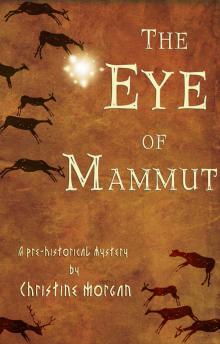 The Eye of Mammut
The Eye of Mammut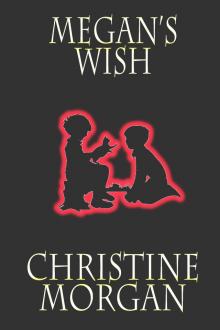 Megan's Wish
Megan's Wish Endless Miles
Endless Miles For The Best
For The Best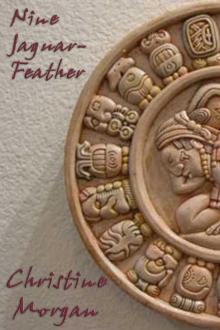 Nine Jaguar-Feather
Nine Jaguar-Feather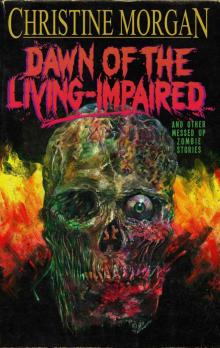 Dawn of the Living-Impaired
Dawn of the Living-Impaired Resonator: New Lovecraftian Tales From Beyond
Resonator: New Lovecraftian Tales From Beyond Spermjackers From Hell
Spermjackers From Hell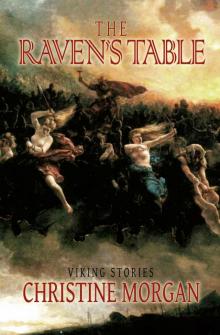 The Raven's Table: Viking Stories
The Raven's Table: Viking Stories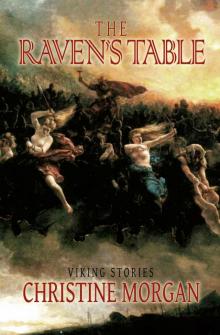 The Raven's Table
The Raven's Table